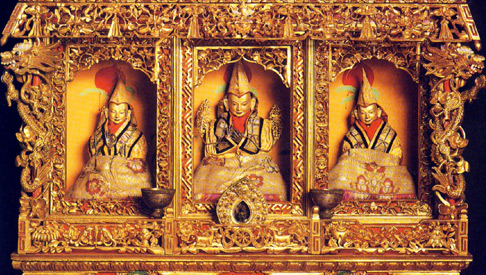Tsongkhapa and nuns
July 27, 2014 4
A couple of nights ago, we had a quiz on Rinpoche’s blog chat. The topic of the quiz was anything to do with Tsongkhapa, from his life story to his practices, to the achievements of his disciples and so on. During the quiz, Rinpoche asked me a couple of questions that gave me pause to think about what inspires me to become a nun.

The specific question was what about Tsongkhapa’s life story has nun-like qualities which inspire me. I wanted to share my answers here before they are lost into the deep, dank wilderness of the interweb, because Rinpoche’s questions encouraged me look deeper into Tsongkhapa’s life not just as a historical figure who brought pure Dharma into the world but as someone who plays a very real and tangible role in my spirituality and my life.
- humility: when Lama Tsongkhapa saw Manjushri, he didn’t believe he was attained enough to see Manjushri. He also never thought that practices were beneath him or that he knew enough, or that he had practiced enough. This inspires me because I am very impatient and it arises from the fact I always think I know better. This type of thinking causes me a lot of problems and gives me a reputation of being angersome, which I am changing. To develop humility will cut down on this type of reactive behaviour, and will create less suffering for myself and others.
- perserverance: Lama Tsongkhapa stayed in retreat for many years. He continued despite the obstacles I presume he will have had, given Tibet’s climate – inclement weather, lack of food, cold, wind, rain, distance from his teachers, etc. This is something I would like to do in the future; Lama Tsongkhapa showed through example that retreats have results, and that obstacles are not permanent and we can overcome them if we persever enough.
- guru devotion: Lama Tsongkhapa composed the praise to Rendawa who offered it back to him. His belief in his lamas was unshakeable and you can see that whatever Lama Tsongkhapa was taught, he put it into practice and he gained the results, of which his whole lifetime is testatement to. No matter how ‘great’ he became, Lama Tsongkhapa always saw himself as below his gurus.
- renunciation: Lama Tsongkhapa lived a very simple life with few possession. This inspires me because seeing someone gain such attainments and results, and not have so much ‘stuff’ makes me realise that everything I find ‘precious’ is really my projection of what is precious and not. This thinking helps me to let go of things, not just physical objects but also situations which disturb my mind.
- teaching the six paramitas by example: whenever someone requested a teaching from him, Lama Tsongkhapa would go above and beyond to pass on his knowledge. Out of his compassion, he was also always studying and practicing, and doing more retreats. He created Gaden out of compassion for sentient beings of his time and in the future. Teaching through actions and examples really inspires me, because it shows me that the person who is teaching is not hypocritical and not practicing double standards with themselves.
Reading the life story of Tsongkhapa again made me realise just what an honour it will be the day I receive my vows. It reminded me of how diligently Tsongkhapa practised to maintain the purity of the vinaya, and how thousands of monks have continued to uphold their vows so that they can be handed down to cretins like me after hundreds of years. Stupid me gets this chance because many kind people before me decided to opt out of samsara, and aim for nirvana o_O thus when I finally receive my vows, the responsibility will be huge – will I become someone who brings pride to my lineage, or will my actions disappoint all of the great masters who have come before me?
So before I receive my vows, before anyone receives any vows, they had best examine what their motivation is for becoming ordained. Is it to escape responsibility? To receive praise? To be treated specially with perks? Or is it to work even harder for others? To transform your mind and root out the ego? To humble down and serve in whatever capacity is necessary, instead of whatever capacity is possible?
Just think. This does not apply only to vows but to everything we do. As Rinpoche says, always examine your mind before taking any action. Examine your motivation and why you are doing or saying something, preferably BEFORE you do or say it. If it is to benefit the other person, no matter how difficult or painful it is for you, do it. If it will not benefit them, then is there another way?
At the end of the day, if you strip away all of the jargon and technicalities, spirituality is about whether an action is beneficial or not…so, were you spiritual today?
4 Comments → “Tsongkhapa and nuns”
Leave a Reply to Elena Cancel reply
Recent Posts
Subscribe to Blog
Categories
Archives
Visitors by Country
| Total Pageviews: | 1 |
|---|



Thanks for sharing! Pastor Jean Ai. This write up has really got me thinking now. (esp, the last 3 paragraphs).
Thanks PJA for sharing this! It’s gotten me to think deeper. Thank you!
Hi, I read Lama Tsongkhapa, but I see no nuns in the article…
Then you may need to read the post a little closer, as well as the content of the blog chat in question 🙂 this is a reflection about the qualities of Tsongkhapa, and what I myself as a nun-to-be wish to accomplish when I become ordained.